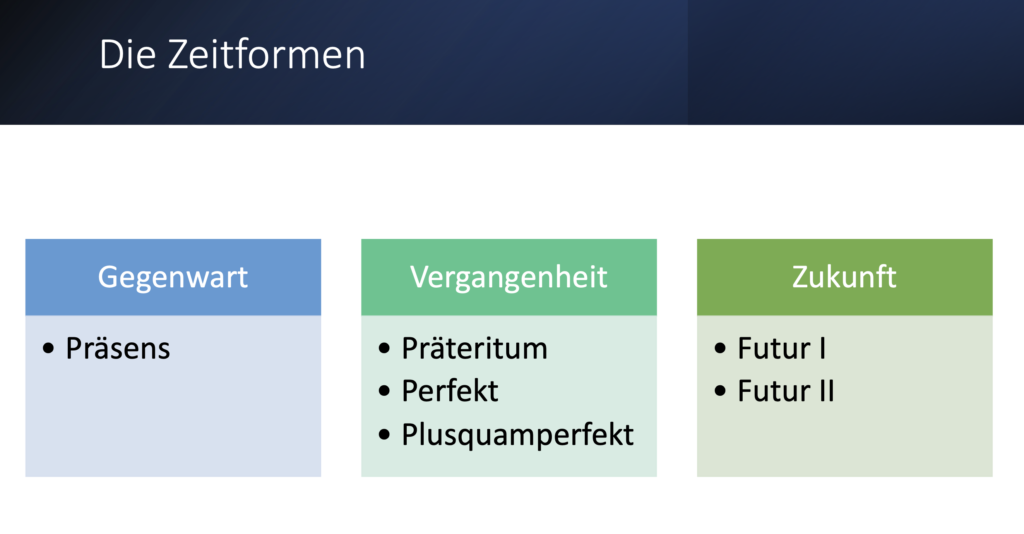Die Zeitformen

Types of German Tenses (Zeitformen)
There are six types of tenses in German to write or speak something about past (Vergangenheit), present (Gegenwart), and future (Zukunft). These are: 1) Präsens, 2) Präteritum, 3) Perfekt, 4) Plusquamperfekt, 5) Futur I, and 6) Futur II. In the following you will find the structures of each of them.
Präsens Bildung (Structure)
Bildung (structure): Subject + verb im Präsens + Object
Example:
- Ich lese ein Buch (I read a book/I am reading a book).
- Wir spielen Fußball (We play football/we are playing football.
N.B: In German there is no present continuous tense like English. “Präsens” is used for both present indefinite and present continuous.
Präteritum Bildung (Structure)
Bildung (structure): Subject + verb im Präteritum + Object
Example:
- Er kochte Nudeln (he cooked Pasta/he was cooking Pasta).
- Wir spielten Fußball (We played Football/we were playing Football.
N.B: In German there is no past continuous tense like English. “Präsens” is used for both past indefinite and past continuous.
N.B: Generally Präteritum is used in writing not in speaking. Using Präteritum in speaking is not a mistake but it is not appreciated.
Perfekt Bildung (Structure)
Bildung (structure): Subject + haben/sein (have/be) im Präsens + Object + main verb im Partizip II
Example:
- Er hat Nudeln gekocht (he has cooked Pasta).
- Wir haben Fußball gespielt (We have played Football.)
Now the question is “Perfekt mit haben or sein”, which helping verb among “haben” and “sein” should we use to form a Perfekt sentence in German. The answer is: it depends on the “main verb” of the sentence.
We will use “sein” in the following cases:
- Verbs of changing location: gehen, kommen, fahren, steigen, sinken, gelangen etc.
- Verbs of state change: aufwachen, einschlafen, wachsen etc.
- Some other verbs: sein, bleiben, werden, passieren, gelingen, misslingen, vorkommen, geschehen
For example:
- Ich bin müde gewesen (I have been tired). In this sentence main verb is “sein” and helping verb is also sein. Gewesen is Partizip II of sein.
- Ich bin nass geworden (Partizip II of werden)
We will use “haben” in the following cases:
- Verb with Akkusativ-Ergänzung, for example: er ist mit dem bus gefahren (he has gone with the bus) vs er hat den bus gefahren (he has driven the bus).
- All reflexiven Verben
- All Modalverben
- Most of the other verbs.
Plusquamperfekt Bildung (Structure)
Bildung (structure): Subject + haben/sein (have/be) im Präteritum + Object + main verb im Partizip II
Example:
- Sie (they) hatten die Koffer gepackt.
- Sie (she) war eingeschlafen.
Now the question is “Plusquamperfekt mit hatten or waren”, which helping verb among “haben” and “sein” should we use to form a Plusquamperfekt sentence in German. The answer is same like Perfekt.
Futur I Bildung (Structure)
Bildung (structure): Subject + werden + Object + main verb im Infinitiv
Example:
- Sie (they) werden die Koffer packen.
- Ich werde die Koffer packen
- Nächsten Monat werde ich Sie besuchen (next month I will visit you)
Futur II Bildung (Structure)
Bildung (structure): Subject + werden + Object + main verb im Partizip II + haben/sein
Example:
- Bis zum nächsten Sommer werden wir das Haus renoviert haben.
- Vermutlich wird er schon gegangen sein, wenn wir ankommen.
- Bis zum Ende des Jahres werdet ihr alle Prüfungen abgeschlossen haben.
Now the question is “Futur II mit haben or sein”, which helping verb among “haben” and “sein” should we use to form a Futur II sentence in German. The answer is same like Perfekt and Plusquamperfekt.
